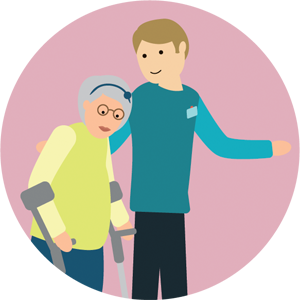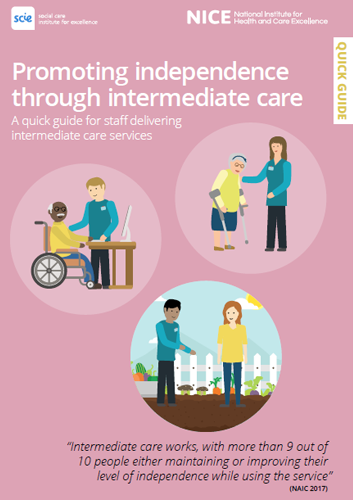A quick guide for staff delivering intermediate care services
Intermediate care involves you working closely with people to agree what intensive support they need to improve their independence. It's important you are clear that this is a short term service that works towards specific goals and is different from ongoing care and support.
Communication
Good communication is a key part of intermediate care. Make sure you:

Give people details of who to go to with questions or worries.

Explain how to contact an advocate.

Help people to make decisions about, and benefit from, intermediate care by giving them information in a format they understand.

Keep up good communication and information sharing with other agencies.
Core principles
These are the things you need to do to provide an effective service:
- Build an equal partnership - find out what motivates the person and what they want to achieve.
- Focus on strengths - what can the person already do, and how can you build on it?
- Build resilience and confidence - what will help the person feel more able to manage daily living?
- Observe and encourage - even when the person is finding an activity difficult and you want to help or do it for them.
- Support positive risk-taking - think about the benefits of taking risks, and the drawbacks of avoiding them.
Intermediate care works, with more than 9 out of 10 people either maintaining or improving their level of independence while using the service.
Person-centred planning
Work together with the person to plan their intermediate care. Talk to them about what will happen when the service ends and put plans in place for this. Make sure that the person:
- understands what is involved in using the service
- is aware of the need to consent for their information to be shared
- understands that intermediate care is a short-term service
- knows what other support is available after intermediate care
- knows how to ask for the service again if they need it.
Personalised goals
Choosing the right goals is important. Agree goals with the person, taking into account what is important to them and what the service aims to achieve. Goals can include things like taking part in social or leisure activities, as well as practical or everyday tasks. Make sure the person's goals:
- can be measured
- take their health and wellbeing into account
- reflect what they want to achieve both during the service and beyond
- consider how their conditions or experiences affect them
- reflect their best interests and wishes.
Write down the goals that have been agreed and give a copy to the person. Give a copy to their family members or carers as well if the person agrees to this.

Risk
Supporting people to regain their confidence and independence requires some positive risk taking. Risk assessment and planning can help to manage risk and maximise the potential for people to achieve their goals. Think about:
- the person's wishes and quality of life
- risks linked to specific activities or the environment
- what might help reduce any risk e.g. equipment, reminders, support from others
- what effect taking the risk might have for the person and for the staff supporting them.
Staff skills and knowledge
Staff working in intermediate care services need to:
Support people to optimise their recovery; take control of their lives; regain as much independenceas possible; plan for when the service has ended.

Recognise and respond to conditions (for example, diabetes, dementia, sensory loss); support needs (for example, nutrition, continence as well as end of life); changing health and circumstances.

Understand that intermediate care should be available for everyone who needs it; how to work collaboratively; the ethos of the service - to support people to build independence.

Useful links
- Intermediate care including reablement (NICE guideline)
- Intermediate care including reablement (NICE quality standard)
- Intermediate care (SCIE Highlights paper)
- Developing effective services that make a difference to people's lives (NICE/SCIE webinar)
- National Audit of Intermediate Care (NAIC) key resources (NHS Benchmarking Network)
- Strength-based approaches (SCIE Care Act 2014 guide)

Download this guide
We've created a copy of this guide that you can print and share:
Promoting independence through intermediate care quick guide (PDF)
This content has been co-produced by NICE and the Social Care Institute for Excellence (SCIE). It is based on NICE’s guideline and quality standard on Intermediate care including reablement.